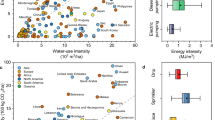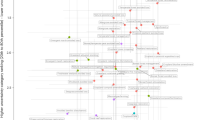Abstract
Emission reduction scenarios to meet climate change mitigation policy goals rarely explore the differential impact of alternative pathways on access to energy for different economic strata of society across countries. Here we show that even under optimistic socioeconomic growth scenarios, inequalities in use of modern energy in homes could persist. We find that, although access improves in high growth scenarios, over 10% of populations in sub-Saharan Africa and South Asia could lack access to energy services for thermal comfort, food preparation and conservation, and cleaning in 2050. Ambitious climate mitigation scenarios do not substantially alter household access to energy services in the Global South, and only affect gas consumption in high-income regions. Our work suggests that efforts to meet climate mitigation policy goals are not at odds with progress towards universal access to modern energy services in the Global South, however, directed policy will be needed to meet access goals.
This is a preview of subscription content, access via your institution
Access options
Access Nature and 54 other Nature Portfolio journals
Get Nature+, our best-value online-access subscription
$29.99 / 30 days
cancel any time
Subscribe to this journal
Receive 12 digital issues and online access to articles
$119.00 per year
only $9.92 per issue
Buy this article
- Purchase on Springer Link
- Instant access to full article PDF
Prices may be subject to local taxes which are calculated during checkout






Similar content being viewed by others
Data availability
Links to the micro datasets that were used in the analysis are included in the Supplementary Data. Given that some of these datasets are not publicly available due to required preregistrations or confidentiality agreements (see Supplementary Table 1), the data used for the estimation module are only available from the corresponding author on reasonable request. The simulated datasets generated during the current study are also available from the corresponding author on reasonable request. Estimation and simulation results presented in the study are included in the Supplementary Data.
Code availability
The codes used during the current study are available from the corresponding author on reasonable request.
References
Bazilian, M. et al. Energy access scenarios to 2030 for the power sector in sub-Saharan Africa. Util. Policy 20, 1e16 (2012).
Dalla Longa, F. & van der Zwaan, B. Heart of light: an assessment of enhanced electricity access in Africa. Renew. Sustain. Energy Rev. 136, 110399 (2021).
Dagnachew, A. G. et al. The role of decentralized systems in providing universal electricity access in sub-Saharan Africa—a model-based approach. Energy 139, 184–195 (2017).
Pachauri, S. et al. Pathways to achieve universal household access to modern energy by 2030. Environ. Res. Lett. 8, 021015 (2013).
Pachauri, S., Alstone, P., Rao, N. D. & Cameron, C. Outlook for modern cooking energy access in Central America. PLoS ONE https://doi.org/10.1371/journal.pone.0197974 (2018).
Panos, E., Densing, M. & Volkart, K. Access to electricity in the World Energy Council’s global energy scenarios: an outlook for developing regions until 2030. Energy Strateg. Rev. 9, 28–49 (2016).
Van de Ven, D.-J. et al. Integrated policy assessment and optimisation over multiple Sustainable Development Goals in Eastern Africa. Environ. Res. Lett. 14, 094001 (2019).
Kartha, S., Kemp-Benedict, E., Ghosh, E., Nazareth, A. & Gore, T. The Carbon Inequality Era: An Assessment of the Global Distribution of Consumption Emissions Among Individuals from 1990 to 2015 and Beyond (Stockholm Environment Institute and Oxfam International, 2020); https://www.sei.org/publications/the-carbon-inequality-era/
Oswald, Y., Owen, A. & Steinberger, J. K. Large inequality in international and intranational energy footprints between income groups and across consumption categories. Nat. Energy 5, 231–239 (2020).
Falchetta, G., Pachauri, S., Byers, E., Danylo, O. & Parkinson, S. C. Satellite observations reveal inequalities in the progress and effectiveness of recent electrification in sub-Saharan Africa. One Earth 2, 364–379 (2020).
Mastrucci, A., Byers, E., Pachauri, S. & Rao, N. D. Improving the SDG energy poverty targets: residential cooling needs in the Global South. Energy Build. https://doi.org/10.1016/j.enbuild.2019.01.015 (2019).
Tracking SDG 7: The Energy Progress Report: Progress Towards Sustainable Energy (Energy Sector Management Assistance Program, 2021); https://trackingsdg7.esmap.org/
Putti, V. R., Tsan, M., Mehta, S. & Kammila, S. The State of the Global Clean and Improved Cooking Sector (ESMAP and GACC, 2015); https://openknowledge.worldbank.org/bitstream/handle/10986/21878/96499.pdf
Ayaburi, J., Bazilian, M., Kincer, J. & Moss, T. Measuring ‘Reasonably Reliable’ access to electricity services. Electr. J. 33, 106828 (2020).
Rao, N. D., Min, J. & Mastrucci, A. Energy requirements for decent living in India, Brazil and South Africa. Nat. Energy 4, 1025–1032 (2019).
Millward-Hopkins, J., Steinberger, J. K., Rao, N. D. & Oswald, Y. Providing decent living with minimum energy: a global scenario. Glob. Environ. Change 65, e102168 (2020).
Chakravarty, S. & Tavoni, M. Energy poverty alleviation and climate change mitigation: is there a trade off? Energy Econ. 40, S67–S73 (2013).
Grubler, A. et al. A low energy demand scenario for meeting the 1.5 °C target and sustainable development goals without negative emission technologies. Nat. Energy 3, 515–527 (2018).
Daioglou, V., van Ruijven, B. J. & van Vuuren, D. P. Model projections for household energy use in developing countries. Energy 37, 601–615 (2012).
Waite, M. et al. Global trends in urban electricity demands for cooling and heating. Energy 127, 786–802 (2017).
Serrano, S., Ürge-Vorsatz, D., Barreneche, C., Palacios, A. & Cabeza, L. F. Heating and cooling energy trends and drivers in Europe. Energy 119, 425–434 (2017).
Ürge-Vorsatz, D., Cabeza, L. F., Serrano, S., Barreneche, C. & Petrichenko, K. Heating and cooling energy trends and drivers in buildings. Renew. Sustain. Energy Rev. 41, 85–98 (2015).
Cao, X., Dai, X. & Liu, J. Building energy-consumption status worldwide and the state-of-the-art technologies for zero-energy buildings during the past decade. Energy Build. 128, 198–213 (2016).
O’Neill, B. C. et al. The roads ahead: narratives for Shared Socioeconomic Pathways describing world futures in the 21st century. Glob. Environ. Change 42, 169–180 (2017).
Riahi, K. et al. The Shared Socioeconomic Pathways and their energy, land use, and greenhouse gas emissions implications: an overview. Glob. Environ. Change 42, 153–168 (2017).
Samir, K. C. & Lutz, W. The human core of the Shared Socioeconomic Pathways: population scenarios by age, sex and level of education for all countries to 2100. Glob. Environ. Change 42, 181–192 (2017).
Jiang, L. & O’Neill, B. C. Global urbanization projections for the Shared Socioeconomic Pathways. Environ. Change 42, 193–199 (2017).
Crespo Cuaresma, J. Income projections for climate change research: a framework based on human capital dynamics. Glob. Environ. Change 42, 226–236 (2017).
Rao, N. D., Sauer, P., Gidden, M. & Riahi, K. Income inequality projections for the Shared Socioeconomic Pathways (SSPs). Futures 105, 27–39 (2019).
McCollum, D. L. et al. Energy investment needs for fulfilling the Paris Agreement and achieving the Sustainable Development Goals. Nat. Energy 3, 589–599 (2018).
Cabeza, L. F., Urge-Vorsatz, D., McNeil, M. A., Barreneche, C. & Serrano, S. Investigating greenhouse challenge from growing trends of electricity consumption through home appliances in buildings. Renew. Sustain. Energy Rev. 36, 188–193 (2014).
Rao, N. D. & Ummel, K. White goods for white people? Drivers of electric appliance growth in emerging economies. Energy Res. Soc. Sci. 27, 106–116 (2017).
Mainali, B., Pachauri, S. & Nagai, Y. Analyzing cooking fuel and stove choices in China till 2030. J. Renew. Sustain. Energy 4, 031805 (2012).
Thomas, S. & Rosenow, J. Drivers of increasing energy consumption in Europe and policy implications. Energy Policy 137, 111108 (2020).
Isaac, M. & van Vuuren, D. P. Modeling global residential sector energy demand for heating and air conditioning in the context of climate change. Energy Policy 37, 507–521 (2009).
Khosla, R. et al. Cooling for sustainable development. Nat. Sustain. https://doi.org/10.1038/s41893-020-00627-w (2020).
van Ruijven, B. J., De Cian, E. & Sue Wing, I. Amplification of future energy demand growth due to climate change. Nat. Commun. 10, 2762 (2019).
Poblete-Cazenave, M. & Pachauri, S. A model of energy poverty and access: estimating household electricity demand and appliance ownership. Energy Econ. 98, 105266 (2021).
Lange, S. EartH2Observe, WFDEI and ERA-Interim Data Merged and Bias-Corrected for ISIMIP (EWEMBI) (GFZ Data Services, 2016); https://dataservices.gfz-potsdam.de/pik/showshort.php?id=escidoc:3928916
Energy-efficient Design of Low-rise Residential Buildings (ASHRAE, 2004).
Poblete-Cazenave, M. & Pachauri, S. A Simulation-based Estimation Model of Household Electricity Demand and Appliance Ownership (MPRA, 2020).
Gourieroux, C., Monfort, A. & Renault, E. Indirect inference. J. Appl. Econom. 8, S85–S118 (1993).
Huppmann, D. et al. The MESSAGEix Integrated Assessment Model and the ix modeling platform (ixmp): an open framework for integrated and cross-cutting analysis of energy, climate, the environment, and sustainable development. Environ. Model. Softw. 112, 143–156 (2019).
Acknowledgements
All authors received funding from the European Union’s Horizon 2020 research and innovation programme under grant agreement no. 821124 (NAVIGATE).
Author information
Authors and Affiliations
Contributions
M.P.-C. and S.P. conceived the initial framework. M.P.-C., S.P. and B.v.R. designed the research. M.P.-C., A.M. and E.B. prepared the data. M.P.-C. performed the modelling, wrote the codes and carried out the analysis. M.P.-C. and S.P. led the writing of the paper with all other authors contributing.
Corresponding author
Ethics declarations
Competing interests
The authors declare no competing interests.
Additional information
Peer review information Nature Energy thanks Alexandros Nikas, Jon Sampedro and the other, anonymous, reviewer(s) for their contribution to the peer review of this work.
Publisher’s note Springer Nature remains neutral with regard to jurisdictional claims in published maps and institutional affiliations.
Supplementary information
Supplementary Information
Supplementary Figs. 1–7 and Tables 1 and 2.
Supplementary Data
Supplementary data including scenario drivers, estimation results and data behind the figures.
Rights and permissions
About this article
Cite this article
Poblete-Cazenave, M., Pachauri, S., Byers, E. et al. Global scenarios of household access to modern energy services under climate mitigation policy. Nat Energy 6, 824–833 (2021). https://doi.org/10.1038/s41560-021-00871-0
Received:
Accepted:
Published:
Issue Date:
DOI: https://doi.org/10.1038/s41560-021-00871-0



